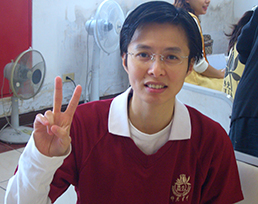個人資料
學術研究
|
姓名: 沈昭吟(釋知賢) 教授 |
現職:
|
專長:
|
信箱(e-mail): cyshen@nhu.edu.tw |
分機:
|
辦公室時間:
|

-
Shen,Chao-Ying(Ven.Shih Zhi-Hsien), Thien Nguyen Phuoc(2017), By Using Buddhist Systems Methodology(BSM) to solve Vietnam Buddhist University Organizational Problems, Applied Science and Management Research, Vol.4, No.1, pp.14-23.
-
Shen,Chao-Ying(Ven.Shih Zhi-Hsien), Hoang Phuong Trinh(2017), The relative study of adversity quotient, job stress and work performance-the case studies in Ha Noi, Vietnam, Applied Science and Management Research, Vol.4, No.1, pp.151-160.
-
Shen, C.Y. and Midgley, G.(2015), Action Research in a Problem Avoiding Culture Using a Buddhist Systems Methodology, Action Research , pp.170-193.(SSCI/SCI/AHCI)
-
Shen, Chao-Ying (Ven. Zhi-Hsien)(2014),The Result of Systems Thinking as Knowledge Assets Work in an Organization, Journal of International Management Studies,Vol.9, No.2 , pp.95-104.(ABI/ProQuest/EBSCO/ULRICH'S)
-
Shen,Chao-Ying(Ven. Zhi-Hsien)(2014), The Study on the Construction of a Buddhist Community as a Learning Organization Based on Systems Thinking & Perspective, and its Prospects, Applied Science and Management Research , Vol.1, No.1, pp.134-146.
-
Shen, Chao-Ying(2014), Critical View on Decision-Making Mechanism of Western Management Science Systems from the Perspective of Eastern Buddhist Systems Thinking, Journal of International Management Studies,Vol.9, No.2 , pp.6-19.(ABI/ProQuest/EBSCO/ULRICH'S)
-
Shen,Chao-Ying and Huang, Shih-Ying (2014)Relative Study of Adversity Quotient, Job Stress, Work Value, and Turnover Intention of Taiwanese Aborigines Employees, International Journal of Business Management and Research,Vol.41, No.1 , pp.1161-1173.(ABI/ ProQuest/EBSCO/CABELL'S/ULRICH'S)
-
Shen, Chao-Ying(Ven. Zhi-Hsien)(2014), A Study Investigating the Influence of Demographic Variables on Adversity Quotient,The Journal of Human Resource and Adult Learning, Vol.10, No.1, pp.22-32.(ABI/ ProQuest/EBSCO/CABELL'S/ULRICH'S)
-
Shen,Chao-Ying(2014),The Relative Study of Gender Roles, and Job Stress and Adversity Quotient,The Journal of Global Business Management,Vol.10, No.1, pp.19-32.(ABI/ProQuest/EBSCO/CABELL'S/ULRICH'S)
-
C. Y. Joy, SHEN (Ven. Dr. Zhi-Hsien)(2014), Effect of Leadership Behavior on Non-Profit Organization Trust and Organization Loyalty, The International Journal of Business and Management , Vol.2, No.4, pp.164-171. (ABI/ProQuest/EBSCO)
-
釋慧開、李坤崇、沈昭吟(釋知賢)(2014),自覺學習的意涵及其方法, 教育研究月刊 ,248期:117-132。
-
沈昭吟(釋知賢)、留偉民(2014),女性軍訓教官逆境商數與工作壓力之相關研究-以人口變項為干擾變數, 經營管理論叢 ,9卷,2期:1-18。
-
Shen, Chao-Ying (2014), Study on Sustainable Operation in Traditional Industry: Application of Buddhist Systems Methodology (BSM) and Statistical Analysis, Journal of International Management Studies . Vol.9, No.1, pp.117-135. (ABI/ProQuest/EBSCO/ULRICH'S)
-
沈昭吟(釋知賢) 、留偉民(2014),女性軍訓教官之工作壓力與幸福感相關研究, 遠東學報 ,31卷,1期:1-9。
-
Shen, Chao-Ying and Midgley, G. (2014), Developing a Systemic Problem Structuring Method for Use in a Problem-Avoiding Culture, Research Memorandum , No. 92. Hull University Business School. (ISBN:978-1-906422-29)
-
沈昭吟(釋知賢) 、留偉民(2013),軍訓教官之工作壓力、逆境商數與幸福感相關研究-以雲嘉南地區高中職學校為例, 國防管理學報 ,34卷,2期:19-38。
-
沈昭吟(釋知賢) 、詹昆霖(2013),傳統產業員工之逆境商數對工作壓力與離職意圖之相關研究, 朝陽管理學報 ,12卷,1期:33-63。
-
沈昭吟(釋知賢) 、劉禮維、詹昆霖(2013),企業員工之性別角色對人格特質、逆境商數與工作績效關係之影響, 創新與管理 ,10卷,2期:117-151。
-
沈昭吟(釋知賢) (2013),企業員工之逆境商數對其工作壓力之影響, 經營管理論叢 ,9卷,1期:23-37。
-
沈昭吟 、邱聖真(2013),運用佛教系統方法論(BSM)與結構方程模型(SEM)來探討傳統產業永續發展之問題歸因─以台灣傢俱業為案例, 當代商管研究 ,5卷,1期:85-108。
-
釋知賢(沈昭吟) 、葉欣哲(2013),高中教師之宗教信仰與逆境商數相關研究:非營利組織創辦高中與一般高中之比較, 非營利組織管理學刊 ,第13期:62-101。
-
釋知賢(沈昭吟) 、葉欣哲(2012),高中教師之逆境商數對工作滿足相關研究-以人格特質與工作壓力為中介變項, 嘉大體育健康休閒期刊 ,11卷,2期:125-136。
-
釋知賢(沈昭吟) 、邱聖真(2012),探討品牌對傳統產業之重要性-運用佛教系統方法論(BSM)與量化分析法研究, 遠東學報 ,29卷,2期:93-112。
-
釋知賢(沈昭吟) 、邱聖真(2011),行銷組合策略與品牌聯想對購買意願之影響關係-以傢俱業為例, 經營管理論叢 ,7卷,2期:1-12。
-
沈昭吟 、劉建宏(2011),運用系統思考之佛教系統方法論(BSM)探討並綜析幼教組織之問題歸因-以中部某幼兒美語學校為例, 經營管理論叢 ,7卷,1期:51-76。
-
沈昭吟(2011),品牌知名度與行銷概念對佛教組織永續經營之重要性, 非營利組織管理學刊 ,第10期:1-28。
-
沈昭吟、李聰杰、劉禮維(2011),大學教師之逆境商數對工作壓力與工作滿足之相關研究-以南部某私立大學為案例, 非營利組織管理學刊 ,第10期:50-74。
-
沈昭吟、鄭寶菱(2010),大學生的逆境商數與學習壓力、成就動機之相關研究, 非營利組織管理學刊 ,第8期:1-29。
-
沈昭吟、張瑞真(2009),逆境商數、工作壓力與工作滿足關係之研究, 經營管理論叢 ,5卷,1期:21-37。
-
沈昭吟、陳怡汝(2008),品牌知名度與領導行為對非營利組織成員忠誠度之相關研究, 第三部門學刊 ,第10期:35-66。
-
Shen, C.Y., Midgley, G (2007), Toward a Buddhist systems methodology 1: Comparisons between Buddhism and systems theory, Systems Practice and Action Resserch , Vol. 20, No. 3, pp.167-194. ─SSCI
-
Midgley G, Shen, C.Y. (2007), Toward a Buddhist systems methodology 2: an exploratory, questioning approach, Systems Practice and Action Resserch , Vol. 20, No. 3, pp.195-210. ─SSCI
-
Shen, C.Y., Midgley, G (2007), Toward a Buddhist systems methodology 3: An application in a Taiwanese Buddhist organization, Systems Practice and Action Resserch , Vol. 20, No. 3, pp.211-244. ─SSCI
-
沈昭吟(釋知賢)、詹昆霖(2014),逆境商數有效調節性別角色與工作壓力之研究,應用科學暨管理思維與實務研討會,台北:大同大學。
-
沈昭吟(釋知賢)、黃詩瑩(2014),台灣原住民員工之逆境商數對工作壓力、工作價值觀與離職意圖之相關研究,觀光休閒暨當代管理潮流研討會,高雄:義守大學。
-
Hui-Ling Peng, Jian-Hung Chen, Chih-Tung Hsiao, Chao-Ying Shen(2014), Dynamic Analysis of Supply and Demand for Elementary School English Teachers in Taiwan, ISSS 2014 Conference, U.S.A
-
沈昭吟、留偉民(2013),女性軍訓教官之工作壓力與幸福感相關研究,2013金融創新與企業發展學術研討會,台南,崑山科技大學。
-
沈昭吟、劉禮維(2011),逆境商數的探討,2011年第四屆管理與決策學術研討會,嘉義:南華大學。
-
沈昭吟、劉禮維(2011),逆境商數與工作壓力關係之探討,2011第三屆南區管理碩士論文研討會,台南:長榮大學。
-
沈昭吟、邱聖真(2011),行銷組合策略與品牌聯想對購買意願之影響關係,2011年第四屆管理與決策學術研討會,嘉義:南華大學。
-
沈昭吟、邱聖真(2011),運用佛教系統思考方法論(BSM)與量化法來探討傳統產業之品牌對消費者之重要性:以台灣傢俱業為例,2011第三屆南區管理碩士論文研討會,台南:長榮大學。
-
沈昭吟、葉欣哲、詹昆霖(2011),逆境商數對大學生之學習壓力與學習滿意度之相關研究─以南部國立與私立兩間大學企管系大三學生為對象,2011年第四屆管理與決策學術研討會,嘉義:南華大學。
-
沈昭吟、李聰杰(2010),大學教師之逆境商數對情緒調適之相關研究:以南部某私立大學為案例,2010商業管理研討會,台北:國立台北科技大學。
-
沈昭吟、李聰杰(2010),大學教師之情緒調適對工作滿足之相關研究─以南部某私立大學為案例,2010第二屆南區管理碩士論文研討會,台南:長榮大學,1155-1164頁。
-
沈昭吟、陳怡汝(2009),非營利組織的領導行為對組織信任與組織忠誠度之影響,2009第十屆永續發展管理研討會,屏東:屏東科技大學。
-
沈昭吟、陳怡汝(2009),運用行銷策略提升非營利組織品牌知名度對組織成員忠誠度之相關研究,2009當代管理論壇,彰化:大葉大學。
-
沈昭吟(2009),品牌知名度與行銷概念對佛教組織永續經營之重要性,第2屆世界佛教論壇論文集,台灣。
-
沈昭吟、張瑞真(2008),逆境商數對工作壓力與工作滿足之影響,2008年第五屆服務業管理與創新學術研討會,台南:南台科技大學。
-
藍俊雄、沈昭吟、王維新 (2007),以系統動態學建構戰機妥善與器材存量模型,嘉義:南華大學,2007第二屆管理與決策學術研討會。
-
沈昭吟(1999),佛教思想( Buddhist Thinking ) v.s.系統思考( Systems Thinking ): 開發佛光山教團成為現代學習型佛教組織及其未來願景的初探,佛光學論文研討會,佛光山。
-
Shen, C.Y.(1997),To Exploring Humanitarian Buddhist Social Influences By Examining Buddha’s Doctrine That “ Every Living has The Nature of the Buddha ” (藉著討論佛教思想-“ 眾生皆有佛性 ”來探討人間佛教的社會影響),佛光學論文研討會,佛光山
-
Shen, C.Y.(2006) Towards a Buddhist Systems Methodology (BSM): Developing the Theory of the BSM and Testing it in a Taiwanese Buddhist Organization, Ph.D. Thesis, Hull: University of Hull (PhD Dissertation)。
-
Shen, C.Y. (1996) Combining Buddhist thinking and soft systems thinking to explore and learn from a Buddhist organization, MA Dissertation, Hull: University of Hull ( Master Dissertation )。
學習資源
教學資訊
照片集
|
|


